Behind The Door
Behind the door - Brix and Bones : We Interview George, Head Chef
24/03/22

Check out our food review Here
I recently popped into Brix and Bones, located upstairs at Gonzos, for a chat with their head chef, George Wood, about what the restaurant world has been like post pandemic, what got him interested in food, and what it’s like to be part of the Norwich scene.
All right. So just start by telling me a bit about the basics of brix and bones, what you do here?
Yeah, of course. So Brix and Bones opened back in 2019, before the lockdowns and before COVID. It was initially a passion project for the two brothers (Mike and Brad inspirers of Gonzo's). They wanted to have a steak house where they could, you know, eat really good steak, that was the basis.
Then COVID came along and lockdowns followed, the original chefs moved on. They approached me during the second lockdown to come on board, I took a look at the space and then basically decided that there could be so much more than just a steak house. So we basically had a meeting to discuss what my intentions were. We wanted to do more of a fire based menu. They had a grill in here originally, but it was quite a small grill. Then through my personal experience of working over fire, we said that, "you know, we could utilise Norfolk produce and encompass that into a menu that was seasonal". And it was exciting and something new.
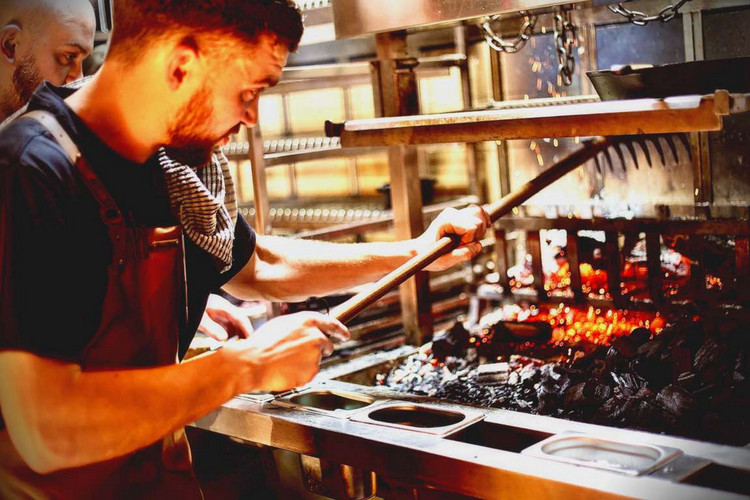
Okay, cool. So you mentioned your personal experience, you've worked a lot abroad, haven't you?
Yeah. So I'm from Norfolk originally. I left Norfolk when I was 21. Went travelling with my best friend and basically started in Southeast Asia, and then got to Australia, where I was for five years, working on the East Coast mainly. Then came back to the UK, went and worked in London for about five years, worked for Neil Rankin. That's really where I started to learn, working with fire, working with barbecuing, smoking, butchery, things like that. We opened a smokehouse in Islington, back in 2013. I was head chef there. He then approached me to open Temper in Soho, which was one of the most anticipated restaurant openings in 2016. So we opened that in 2016, then opened the second site Temper City, just round the corner from the Bank of England, and then I left the company and went abroad again. I went and worked in Sri Lanka for six months in the south. Then went across to Japan where I worked, and then went to Korea, Philippines, Australia, New Zealand, and then back to Japan. Then I was working in Japan in a Wagyu Restaurant in the north islands. Then COVID hit and I came back to the UK... and then came here. So yeah, there's the short version.
So what would you say is the most valuable thing that you've learned from working, essentially all over the world?
I think I've taken different aspects from everywhere I've worked. In my early career, I was very much working in different cuisines to know what it was that I wanted, and taking skills from those. But with working for Neil, it was about buying in animals whole, using the whole animal, doing the butchery ourselves, knowing where the animal came from, developing personal relationships with farmers, as opposed to going through suppliers. Then whilst in Japan, it was this new philosophy of utilising the whole ingredient, so not wasting anything, respecting the ingredient, and there's just a completely different culture in that regard to having the ultimate respect for something and showcasing it in its best light.
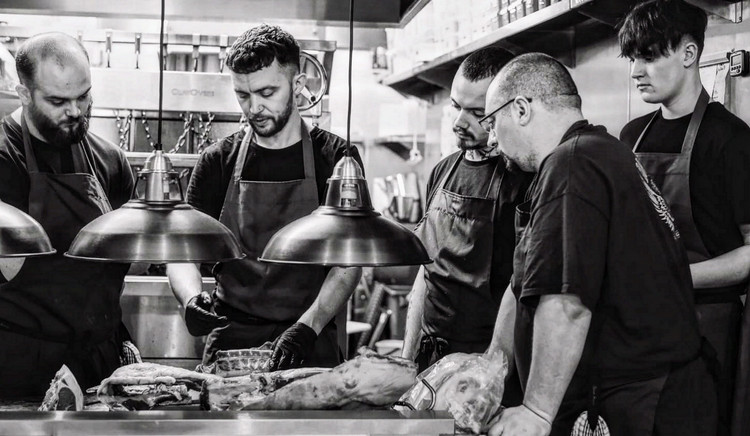 The Kitchen Team
The Kitchen Team
And so that's kind of what you're doing here when you create your menus?
I'd like to think so, yeah. I'd say that on the menu here at Brix, although there's things for example, that are foraged for three weeks of the year, we then pickle them or ferment them or turn them into a powder or a salt or a vinegar so that that ingredient can then be prolonged throughout the year, and you know it's something that's locally sourced. Again, with the pickling and the fermenting, that reduces any wastage. I think that with the ingredients as well, we're not just doing them one way, we're infusing them, or, again, pickling them, or smoking them or using the fire, so that we're using layers of flavour, but the same ingredients, it’s adding a complexity to a dish.
Yeah, that means you've got quite a unique menu as well, and I suppose this is something you feel quite passionate about?
Oh, absolutely. I think, for me, personally, it's an achievement in regards that the brothers have allowed me to have complete autonomy and expression on the menu. That has allowed development of all levels and all sides of the menu. And, it's not just myself involved in that, it's very much a team effort. The guys I've got in the kitchen are all local guys, but they've all been picked for the different areas. So, some are really talented pastry chefs. I've got guys who are into fermenting and pickling and meat. So it's a coordinated effort when the seasons change, such as what ingredients we have to work with, and we all sit down and develop it all together. I wanted to create an environment where chefs have the ability to explore their creativity.
Yeah, I suppose that's fairly unusual for a kitchen. I know in a lot of kitchens, the head chef takes control and it's their way or the high way?
Very much so, yeah, very much so. I feel I've worked in a lot of those environments where, you know, you're working with all this produce, and you have all these ideas, but you can't explore them, because it's very much - this is the dish, this is how it is. For example, when dishes go on the menu here we're constantly tweaking, we're constantly evolving that dish to emulate it to its full capacity. So if something goes on the menu on the Wednesday, and if you were to come in on the Saturday, for example, it might be slightly tweaked or slightly different. Because we've found a way to do something a bit better.
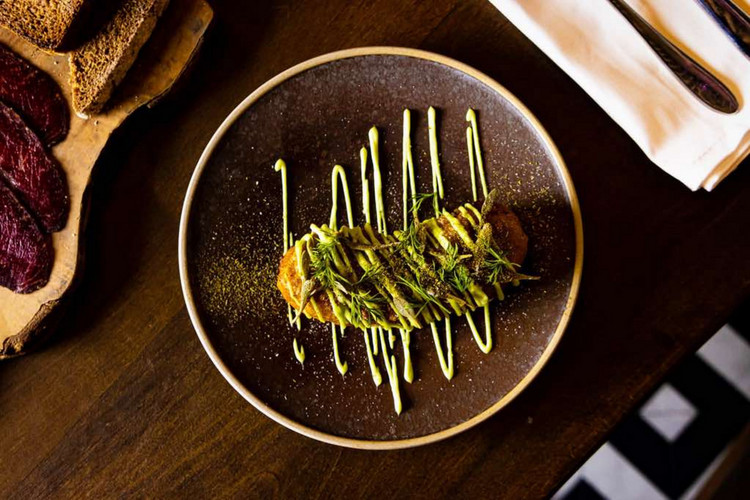
Fish Sausage
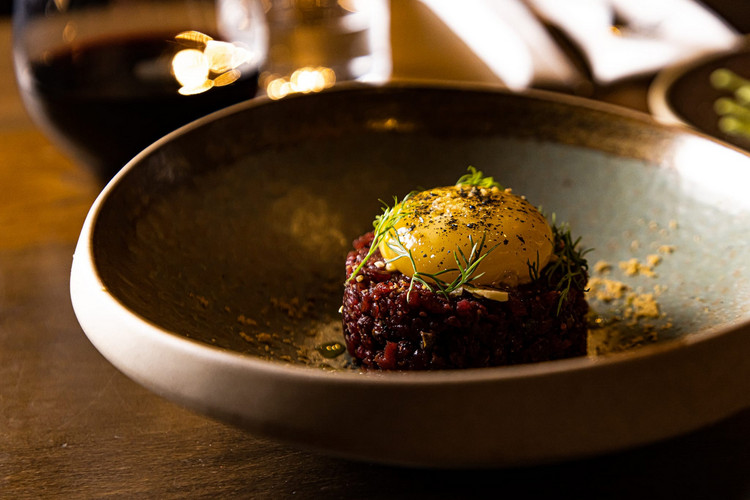 Beetroot Tartare
Beetroot Tartare
So what actually drew you to working in kitchens in the first place?
I've always been passionate about food. My grandmother and her sister were founding members of the Women's Institute. They were really passionate bakers. So as a child, I spent a lot of my time in her kitchen, because she lived just in Thetford, so it wasn't far away from me, and really kind of instilled in me the effort and work and passion that goes into it. So yeah, I would say that was definitely where my initial passion started. It wasn't really until I started travelling, that I started to explore food outside of Norfolk and realise that there was a whole different world out there when it came to food. The more I tried, the more I wanted to explore that. Then later on in my adult life, having the advantage of having worked in good restaurants to be able to then go abroad and explore within a kitchen, as opposed to just eating in a restaurant.
Well, yeah, it's nice to see somewhere that does sort of brand itself as a steak house, doing something a bit more interesting with it, as opposed to, say, standard meat and chips?
I mean, I wouldn't describe this as a steak house at all. I would actually describe us as an open fire restaurant. I think steak is an element of what we do, and it is a cornerstone of the foundation of the restaurant, but it's developing into so much more than that now. I think that fire is at the heart of that, and that's why I would probably describe it as an open fire restaurant as opposed to a steak house. Because, as we say, we try to have as many of our dishes to be influenced by that fire as possible. The steaks are obviously, what they were known for before, and they still will be what we do, but it's just more a part of what we do now as opposed to the whole.
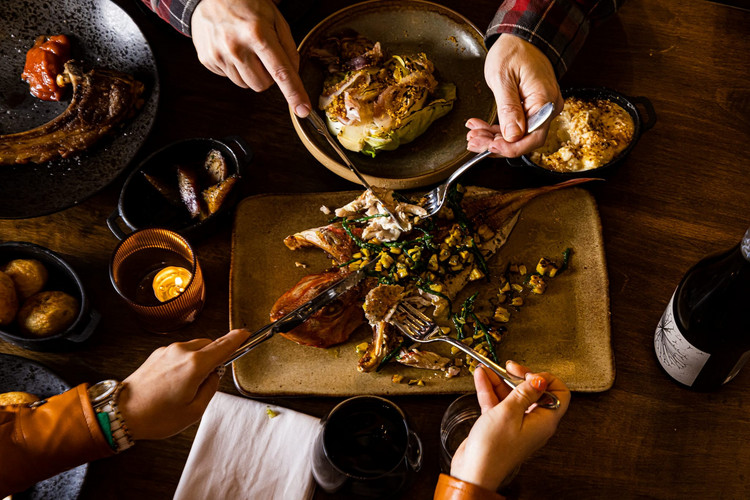 Gunard
Gunard
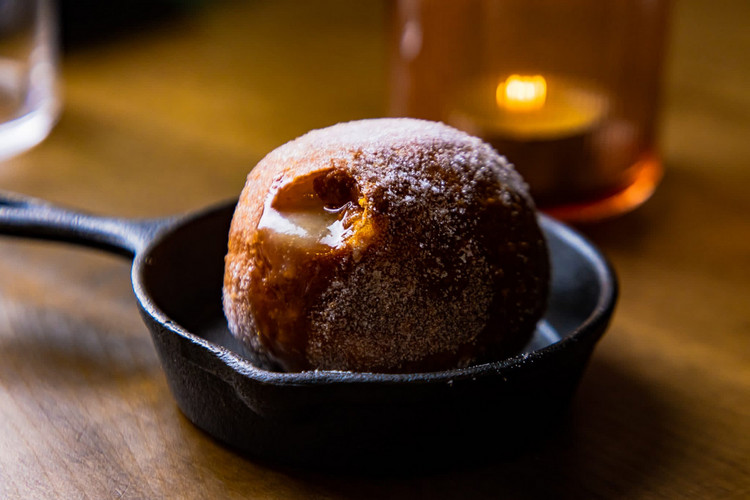
Bonemarrow Doughnut
Okay, fun one then - so if you're on death row, what is your final meal? What would you go for?
Ooh, my final meal? It would probably be toad in the hole to be honest.
A proper classic, it's just the nostalgia around it, I suppose. Or, there was a soba ramen noodle place just north of Sapporo that made these soba noodles like fresh every day. They just literally served the noodle, with some soy sauce and some spring onions. And that's it. And they were honestly, the best. So I mean, it's two ends of the spectrum, but I'd go with toad in the hole, I think.
So presumably, from what you said, like, you grew up around food?
Yeah, bar my nan, my family were kind of like your traditional home cooks, home classics, you know. I wouldn't say by any means that I was raised in a foodie family. I think my interest in food sprung from around when I finished college. I always wanted to go and do art at university and basically was told I wasn't good enough for it, which I kind of knew, but always had this creativity and sense of wanting to put my own spin on things. I found that cooking was a real outlet for that, there weren’t any rules and you didn't have to conform to an expectation of what a dish should be. You could explore it. That's what really pulled me in, that's what really ignited the passion. I feel that, from there it's just been an ever growing thing of focusing on what we're trying to focus on here at Brix. We want to get to a point where we're zero waste. We're a long way off that, but its things like that where the passion continues but it dives into different channels. The passion is constantly evolving, really. So from a food perspective, I'd say the freedom and the creativity more than anything is what I relish.
You can find Brix and Bone’s menu.
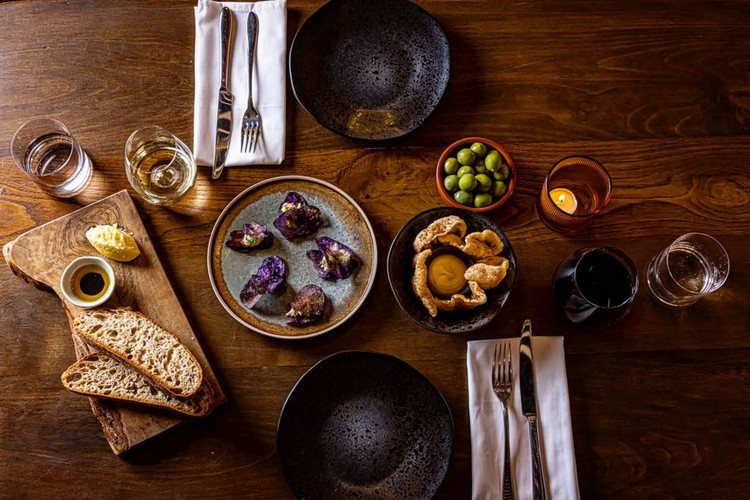 Brix snacks
Brix snacks